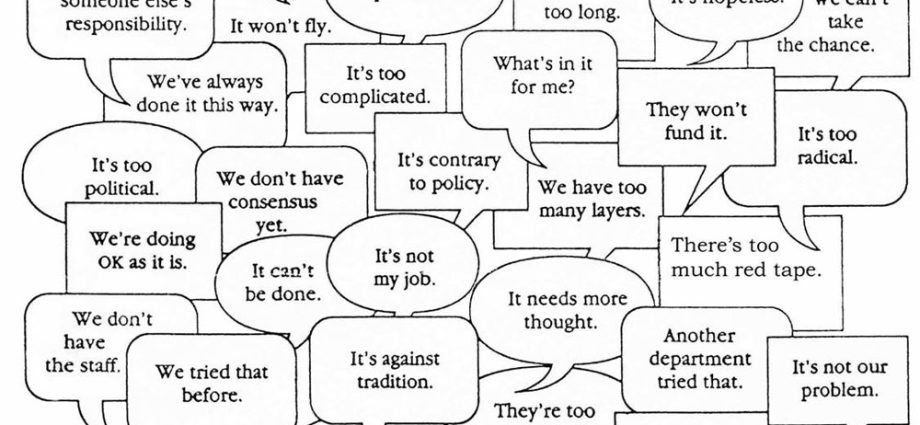What prevents us from becoming different, even if we know that change is necessary and can improve life? Why do we answer the proposal to change the world, starting with ourselves, «yes, but …»? Psychologist Christine Hammond compiled a list of the most common excuses.
I recently gave a lecture on how decision fatigue affects everyday life. The more decisions you have to make during the day, the worse it gets by the end of it. This is especially important for top managers, doctors, lawyers and representatives of other professions who have to make decisions in non-standard situations every day.
Interestingly, my listeners were well-received by the idea, but they did not like the recommendations to change their usual morning and evening routine, stop constantly checking e-mail, take more rest, find a healthier balance between work and free time. In the hall there was noticeable resistance to any innovations. What excuses do people find for not changing:
1. Nothing can be changed. The character does not change.
2. Let others do it, I don’t need it.
3. In truth, we are only pretending to change.
4. Change causes strong emotions, and I don’t like it.
5. I don’t have time for this.
6. It requires constant effort, and I can’t do it.
7. I don’t know how.
8. This requires insight, I do not know how to cause it.
9. I don’t know what to change.
10. It’s always a risk, and I don’t like taking risks.
11. And if I fail, what should I do then?
12. To transform, I will have to face the problems face to face, and I do not want to.
13. I’d rather leave things as they are than start remembering problems from the past.
14. I don’t need change to move on.
15. I can’t, it’s impossible.
16. I already tried to change, and nothing worked.
17. (Someone) changed a lot and became a very unpleasant person.
18. It needs … (someone else), not me.
19. It takes too much effort to change.
20. I cannot try without knowing all the possible results of my efforts.
21. If I change, then: … I can no longer blame my partner / children / parents for my problems.
22. …I will have to take responsibility for my behavior, thoughts and feelings.
23. … I can no longer project my negative attitude onto others.
24. … I will have to work harder and better, to become more efficient.
25. … I can lose all my friends.
26. … relatives may hate me.
27. …I may have to look for another job.
28. …I will have to learn how to communicate more effectively.
29. … can no longer blame others for problems.
30. …it can upset others.
31. …I will have to set new personal boundaries.
32. If I change, I will let down the people who depend on me.
33. If I change, someone will take advantage of this to the detriment of me.
34. I will have to change my habitual expectations about myself and others.
35. I have to admit that I was wrong before, and I can’t stand it.
36. If I do this, I will have to change the usual daily routine.
37. I’m already better than most people, I don’t need to change anything.
38. Only the weak need to change.
39. If I show my emotions more, others will avoid me or treat me badly.
40. If I become honest, I will offend a lot of people I know.
41. If I start to openly say what I think, I will become too vulnerable.
42. It’s too hard.
43. It hurts.
44. If I change, I may be rejected.
45. My partner does not like innovation, if I change, he / she will stop loving me.
46. This is for the millennial generation.
47. It’s uncomfortable.
48. Around and so too much is changing.
49. I hate change.
50. If I do this, I will cease to be myself.
Everyone falls into this trap and finds an excuse not to change their habitual patterns of behavior. Resistance to the new is normal and natural, because it disrupts our internal and external homeostasis. But changes in our lives are as inevitable as the change of seasons. The only question is whether you let others manage or take the lead.
The author is Kristin Hammond, a counseling psychologist.










